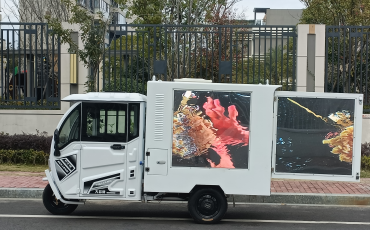SMD and COB are two packaging methods for LED displays. There are similarities but also differences between them. LEGIDATECH explains it in detail.
1. Process introduction
SMD is known as surface mounted devices, meaning surface mounted devices.
The light emitting chips (wafers) are encapsulated into individual lamp beads, which are then soldered to the PCB board to form a unit module, and finally spliced together to form the whole LED screen; 
COB (chips on board, is a new technology to solve the problem of heat dissipation.
The technology route is the optical chip (chip) with conductive or non-conductive adhesive adhesive on the PCB board, lead bonding to achieve electrical connections.
Then the whole unit is covered with adhesive to form a unit module, and finally spliced into the whole LED screen.

2. Product differences
01 |Image difference
SMD screen lamp beads emit light as a single unit, presenting a point light source effect.
COB screens are covered with a film on top of the light-emitting chip, and the light source becomes a surface light source after being scattered and refracted by the film.
Compared to point light sources, surface light sources have better overall visual perception, are not grainy when viewed and can reduce the stimulation of the light source to human eyes, making them more suitable for prolonged near vision.

After the COB screen is integrally packaged using a new process, the contrast can be even higher, reaching more than 20,000:1. The contrast of the SMD screen will not exceed 10,000:1.
In comparison, the viewing effect of the COB screen is closer to that of LCD when viewed from the front. screen, the colors are bright and vivid, and the details are better.

However, since COB screens cannot sort individual lamp beads with similar optical properties like SMD screens, the entire screen needs to be calibrated before leaving the factory.
Although the front viewing effect is excellent, color inconsistencies are prone to occur when viewed from the side at large angles. Phenomenon.
02 |Reliability difference
LED screens with SMD technology, because the light-emitting chips are packaged first and then mounted, have weak overall protection and are prone to knocking off lights.
They have poor waterproof, moisture-proof, and dust-proof properties and cannot be wiped. However, on-site maintenance is convenient, which is beneficial to later stages. maintain.

The LED screen with COB technology is directly chip-mounted and then fully covered with a film. The overall protection is good, and the front protection level can reach IP65. It can effectively prevent water, moisture, and bumps.
It can be cleaned with a wet towel, but due to the overall film coating , it cannot be repaired on site and needs to be returned to the factory for repair with professional equipment, which is more inconvenient.

03 |Energy efficiency difference
The luminescent wafers in the lamp beads of the mainstream products of SMD screens are mostly made of formal assembly technology, and there are leads above the light source to block them.
However, COB screens are mostly made of flip-chip technology, and the light source is not blocked. Therefore, when the same brightness is reached, the power consumption of COB screens is lower and it has higher performance. Good to use and economical.


Formal wear Reverse wear
In addition, due to the low transparency of the epoxy resin used in SMD lamp bead packaging, the overall coating used in COB screens has higher transparency, further improving the economical use of COB screens.
04|Cost difference
The SMD production technology and process are relatively complex, but due to the low technical threshold, there are more than 1,000 manufacturers nationwide, the competition is relatively complete, and the technology development is relatively mature.
The threshold of COB production technology is higher, less than 20 manufacturers with R&D and production ability.
COB technology is still developing rapidly. Although its theoretical cost is lower than that of SMD displays, the cost of COB displays is still at a disadvantage compared to SMD displays with a pitch of 1.2 or more due to the low efficiency rate of the products.




